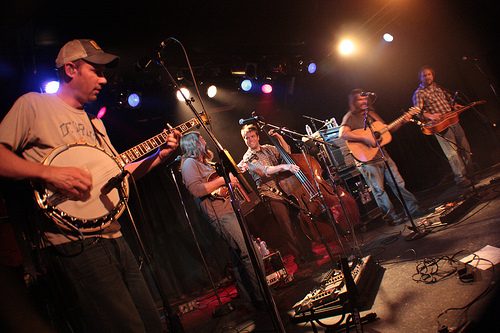
Greensky Bluegrass is putting a new spin on an old style.
Even as far back as 2000, when Greensky Bluegrass was formed, mandolinist Paul Hoffman knew he didn’t want the group to be just another bluegrass band.
“We’re just sort of doing what we like and what we want to play,” Hoffman said. “Our musical tastes are really broad, so even though a lot of our musical ideas aren’t really bluegrass, we aren’t afraid to try them because it’s what we dig.”
Based out of Kalamazoo, Mich., Greensky Bluegrass has cultivated a reputation in the national bluegrass community as a premiere band, taking the music out of the backwoods and modernizing it in a way acceptable to fans and non-fans of the genre alike.
As with other major acts in the modern scene, the quintet is well-known for its mix of strong songwriting and epic live performances that often feature long-form improvised jams and decidedly non-traditional song selections.
According to Hoffman, choosing to play non-bluegrass covers, such as Pink Floyd’s “Time” or Prince’s “When Doves Cry,” started out as more of a practical decision within the band.
“In the early stages of the band, when we were playing a lot of bars in Michigan, the non-bluegrass tunes by musicians like Prince helped to convert people to bluegrass,” Hoffman said. “In Michigan, a lot of people at the time, including myself, weren’t that familiar with bluegrass. When we would come out and play Pink Floyd, the audience would like that, and once they did, it was a kind of gateway to the music of Earl Scruggs and other traditional artists.”
After discovering the genre, Hoffman quickly ascended to the role of a bluegrass picker. Initially a guitar player, Hoffman happened to see mandolin legend David Grisman at a concert and then decided to buy a mandolin. Not long after, Hoffman, banjoist Michael Arlen Bont and guitarist Dave Bruzza got together and Greensky Bluegrass began.
Hoffman prefers to describe his band’s many line-up changes since their inception — from a three-piece bar band to ecstatic improvisational quintet — as growth and evolution rather than a simple case of moving pieces.
“I think it’s important to stay current and grow and change,” Hoffman said. “All music sort of does it, but we’re lucky with bluegrass in a lot of ways because it’s a smaller genre so it’s a little easier to stand out. I don’t envy the guys that decide to be in the band with bass, guitar, keyboards and drums because there certainly are a lot of those and I imagine it’s far more challenging to get noticed.”
With this mindset, it’s surprising to see the band receiving recognition as a signpost in the evolution of bluegrass as a musical art form. Just this past year, after the group’s performance at the Hardly Strictly Bluegrass Festival in San Francisco, Rolling Stone singled out the group as representing the new generation of bluegrass.
In the same year, Greensky Bluegrass’ new record Handguns debuted at No. 3 on the Billboard bluegrass charts.
“It was pretty gratifying to get that kind of recognition for something we worked so hard for and to see that the stuff we do matters,” Hoffman said.
With so many musical avenues opening for Greensky Bluegrass, Hoffman couldn’t be more proud to be a part of a band that is always developing new sounds within its acoustic context.
“We get the nod from the traditional bluegrass guys because we’re doing it right, but we also get the nod from the non-traditional bluegrass guys because we are doing it wrong,” Hoffman said. “It’s kind of like that old saying: You gotta learn the rules to break the rules.”
Greensky Bluegrass will perform at Baltimore’s 8×10 Club tonight. Doors open at 8:00 p.m. Tickets cost $12.



